Pine Bluff, Arkansas
Born and raised in this once-vibrant manufacturing hub along the Arkansas River, Sederick Rice likens his troubled hometown to a popular blues song — “You’ve Got to Hurt Before You Heal.”
Pine Bluff has seen more than its share of pain in recent years. With the 2020 U.S. Census, the community about 40 miles southeast of Little Rock earned the unwelcome distinction of being the fastest-shrinking city in the U.S., losing over 12% of its population in a decade.
At the time, its school district was under state control, deemed unable to provide students a quality education and manage its fiscal affairs as enrollment plummeted. Businesses and families had long since fled, leaving behind a collection of abandoned buildings and boarded-up houses that even some locals compare to “The Walking Dead.”
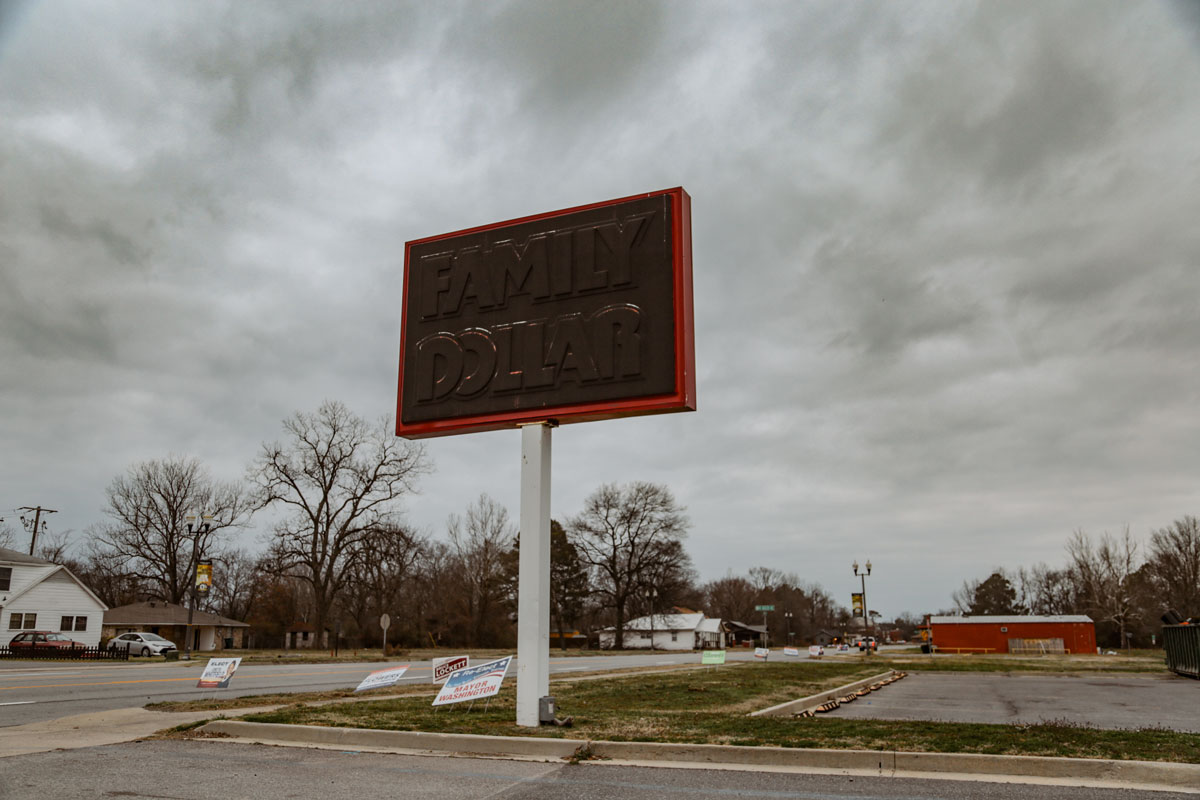
But newcomers and long-time residents now say they’re starting to feel a fragile sense of hope. Big-name brands like Marriott and Chick-fil-A set up shop in town. The district regained authority over its schools. And in August, voters approved a tax increase to replace its run-down high school.
“It’s like surgery,” said Rice, who teaches biology at the local state university. “We’re still in the early stages of our recovery.”
Rice is part of that renewal. He leads the predominantly Black district’s first local school board since 2018. He cheered and applauded with a crowd at the Pine Bluff Convention Center in September when the Arkansas State Board of Education voted unanimously to return the 3,300-student district back to local control.
The changes come as a piece of 2023 state legislation called the LEARNS Act raises teachers’ starting pay from $36,000 to $50,000 and requires third graders to be proficient readers before they can advance. Those changes address two of the district’s greatest challenges — finding qualified teachers and ensuring students can read.
But leaders know it’s going to take a lot more than the promise of reform to convince families to choose Pine Bluff.
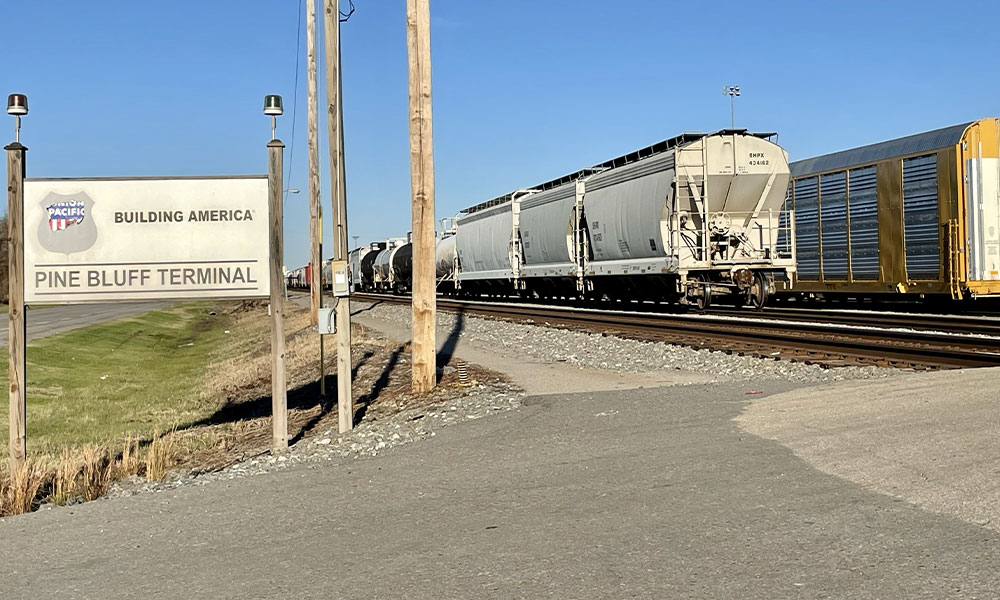
“It’s important that we continue to show improvement in our schools if our city is going to grow and thrive,” said Mayor Shirley Washington, a former Pine Bluff teacher and principal.
Her office sits amid the columns and archways of a 1960s-era office complex historians liken to a “modernized classical temple.” The setting evokes the city’s prosperous past, when large paper mills and parts manufacturers invited job candidates from out of state to visit.
It’s important that we continue to show improvement in our schools if our city is going to grow and thrive.
Pine Bluff Mayor Shirley Washington
“Before they made a final decision to accept that job and move, they would send the mother,” said Washington, who led Cheney Elementary, one of four schools the district has closed since 2015. “I visited with many mothers who came out to the school to see if that was an environment that they would trust.”
‘Baby steps’
For now, the community looks to Superintendent Jennifer Barbaree to restore a sense of confidence. A former state official who oversaw improvement efforts in at least six failing districts, she was well acquainted with Pine Bluff’s struggles when the state appointed her as interim chief in January of 2023. At the time, only 15% of third graders read on grade level, and at some schools, half of the teachers were unlicensed.
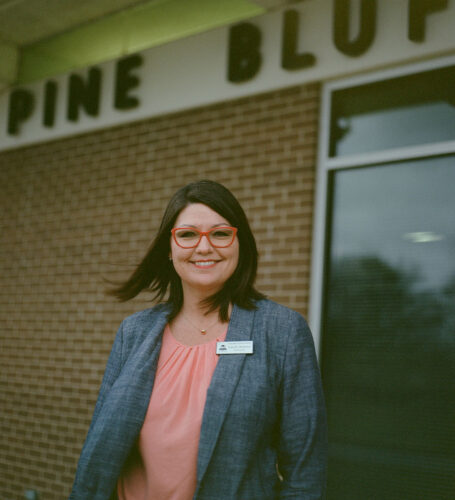
With a three-year contract approved by the board in February, she believes improving the district’s financial health and sprucing up aging facilities will prompt families to give their schools a second look.
“We want our kids back,” she said.
To address teacher quality, she cut 70 positions — all staff members who lacked proper credentials — and sent some instructional coaches back to teach in the classroom. She also created top-level jobs to support principals and ensure teachers follow the curriculum. With these moves in place, she’s hoping for a 3 percentage point increase in reading scores by the end of the school year.
But before addressing instruction, Barbaree had to ensure parents their children weren’t risking their lives just to come to school. Pine Bluff not only topped the declining-population list; it also ranked as one of the least safe cities in the U.S. More than a dozen children between 10 and 19 have been victims of homicides since 2020.
“There were nine students murdered by gun violence within nine months,” Barbaree said. “It was almost a student a month.”
Pine Bluff High School was a major part of the problem. Its open design, with multiple buildings connected by outdoor walkways, was meant to evoke a college campus. But the sprawling layout proved to be a security risk that four armed guards couldn’t handle. Students routinely cut class and walked off site; trespassers weren’t stopped. After several fights broke out in October 2021, the district closed the school for a day. The following spring, the school went on lockdown after suspects fired shots in a parking lot outside a classroom building.
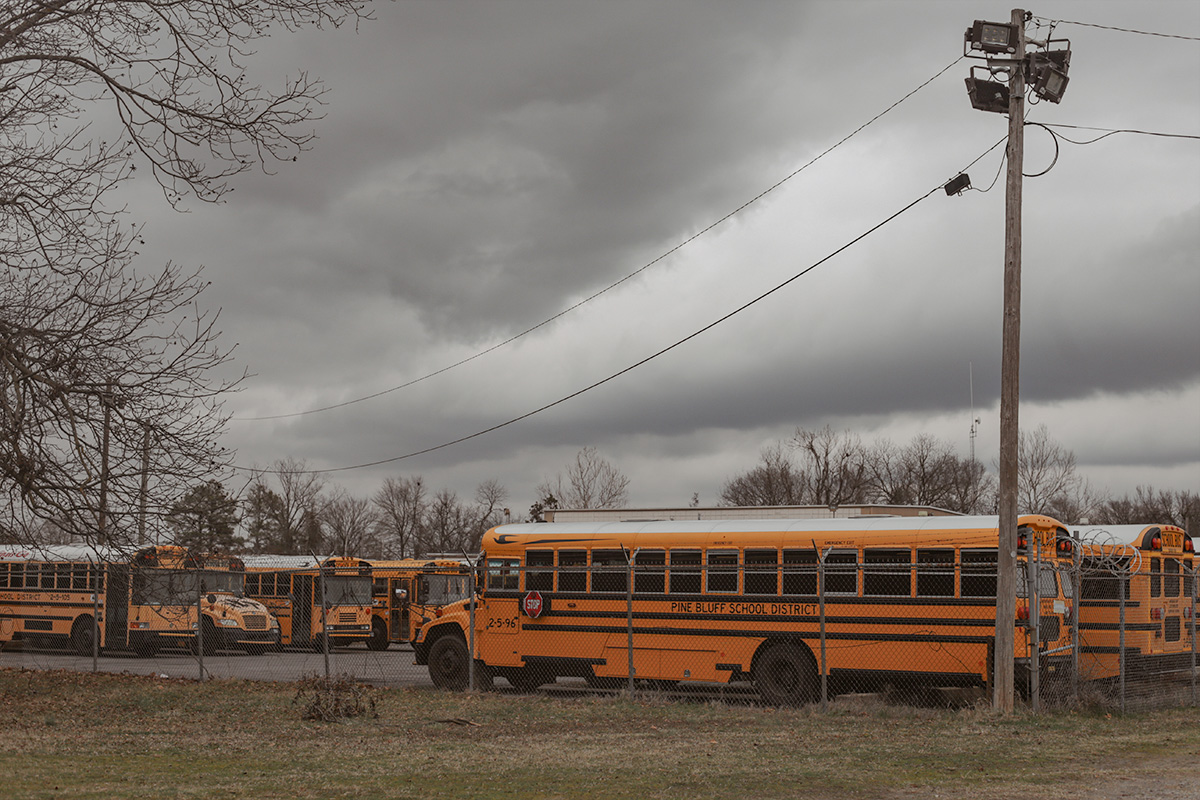
When Barbaree took charge, staff had no schedule assigning them to supervise walkways and other common areas. “Everywhere you looked, you just saw kids; you didn’t see adults,” she said.
Now, there’s a schedule, and 10 officers patrol the property. One of Barbaree’s first moves was to construct a fence around the entire school. Some residents called it an “eyesore,” she said, but Erika Evans, president of the high school’s parent association, isn’t worried about aesthetics.
“The one thing I don’t ever want to hear again is my daughter calling me crying because she’s scared,” said Evans, whose youngest was in ninth grade during the lockdown.
Evans, a career development teacher in Little Rock, is also one of the district’s biggest boosters. She led the campaign for a tax increase to build the new high school, even though her daughter will have graduated by the time it opens. She’s optimistic that a modern facility, with space for performing arts and the latest career and technical equipment, will inspire students and spur development.
“We know nothing is overnight,” she said, “but it’s baby steps.”
‘On the rise’
On a recent Tuesday evening, Evans gathered with Rice, City Councilwoman LaTisha Brunson and Mattie Collins, a retired Pine Bluff teacher, at a modern, downtown space called The Generator. Students meet at the facility, where Collins runs a weekly college and career readiness program, to learn from local professionals about jobs in aviation, health care and engineering. Go Forward Pine Bluff, an economic development initiative, renovated the 1937 building that once housed a community center and jewelry store. The organization also worked with the mayor to build a new aquatics center and land the city’s first Chick-fil-A franchise.
The question is whether jobs and new attractions like a go-kart track will entice families with school-age children — and whether parents will take a chance on a district with five F-rated schools. The sixth, a junior high, has a D rating.
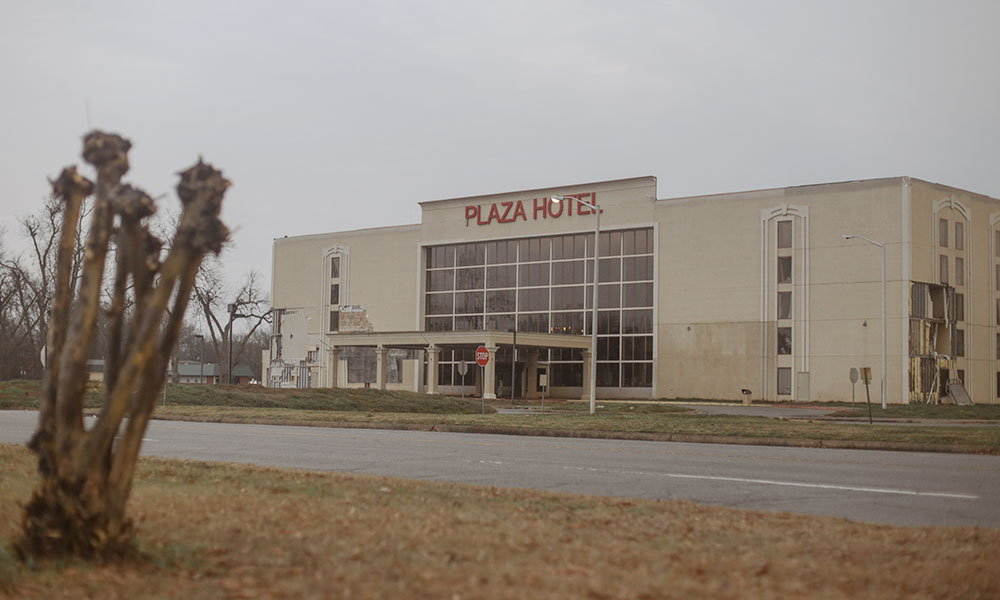
Brunson, who describes herself as a proud Pine Bluff High graduate, is the type of parent the district hopes to win over. In 2018, she left Bentonville, about 260 miles north, and returned to her hometown for a human resources job at the local University of Arkansas campus. She won her seat on the city council in 2022 and is working to bring a new grocery store to the east side of town.
But after hearing “horror stories” about teacher shortages, she opted to enroll her two children in the neighboring White Hall district. She hopes they’ll eventually attend Pine Bluff schools, which she describes as “on the rise to greatness.”
‘Filling rooftops’
Other families settling in Pine Bluff choose charter schools, a trend that initially troubled the mayor, who once ran the local teachers union. Though she still thinks charters “cherry pick” high-achieving students, she changed her outlook when she saw that giving families meaningful options made them more likely to stay.
“As mayor, you’re looking at filling rooftops and keeping those rooftops full,” she said. “Many times people are moving because … they can’t find the school that’s offering the quality education that they’re looking for.”
Washington supported the state’s move to take over the district. Not only were leaders failing students academically, they couldn’t manage the district’s finances. For years, they added staff even as enrollment fell. At the time of the takeover, they were late on the light bill and could barely make payroll.
“We were our own worst enemy,” said Henry Dabner, a former board member. He blamed “too much in-house fighting” and hostility to receiving help from outside experts for “a tainted culture.”
In 2022, in a gradual transition back to local control, a special committee that included state leaders and Pine Bluff residents chose the current seven-member school board. Elections resume this fall, initially with just one seat up for a vote.
State officials are watching closely to see if Barbaree pushes the academic needle forward. As chief, she’s accountable for reaching academic targets at each of the district’s six schools — another provision of the LEARNS Act.
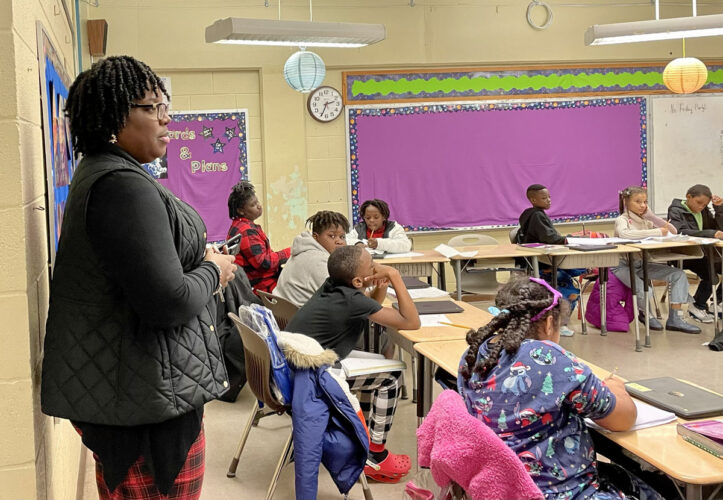
“The scores are still low,” Stacy Smith, deputy commissioner at the Arkansas Department of Education, told the state board in August. Last year, 19% of Pine Bluff’s third graders met or exceeded standards in math, compared with 54% statewide. In English language arts, 15% of students were proficient or above. The statewide average was 39%. “They’re not where they’re supposed to be,” Smith said. “But the foundation has been laid for them to actually start focusing on the right stuff.”
Despite the recent push, some residents remain skeptical of the district’s ability to right itself.
“Pine Bluff has a long history of electing poor leadership. I hope that ends and we do a better job,”said Chris Hart, CEO of Central Moloney Inc., a welding company that sponsors a basketball tournament and offers workforce training to high school students. Nevertheless, he wished the superintendent well.
“I commend anybody willing to swim upstream.”
‘What about something for us?’
When it comes to recent efforts to clean up the city, students are among the least impressed. They protested outside Pine Bluff High in 2022 following the death of a student and complained that teens lack safe, positive ways to spend their time after school.
Brooklynn Blanks, a 10th grader, pointed to the casino the Quapaw Nation opened on the southeast side of town in 2020.
“What about something for us?” she asked. “We’ve got to go all the way to Little Rock just to go to an arcade or to go shopping.”
Brooklynn finds inspiration in her meetings with SOAR, Students of Achievement and Responsibility, a mentoring program that meets on the fourth floor of a large Methodist church downtown. Michael Garlington, a dean at a charter school in Little Rock, runs the program. He tutored while attending the University of Arkansas at Pine Bluff and now recruits other college students to do the same.
On a Monday night in December, SOAR’s teens opened their daily session with an affirmation: “I won’t be like anyone else. I will push myself, better myself and elevate myself.”
They snacked on cookies and fine-tuned essays on improving their community — work that earned four of them a trip to Washington, D.C., this month as part of a competition sponsored by 4-H, the youth development organization.
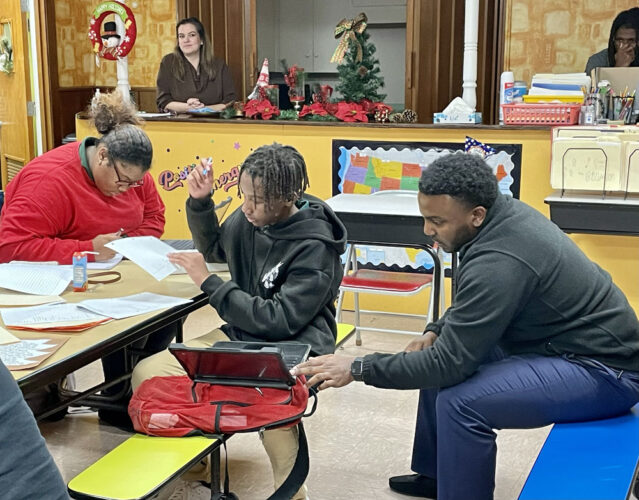
SOAR, Brooklynn said, pushed her out of her shell.
“When I come here, I get happy. I bloom,” she said. “I want to do more because of what they say they can help me do. They see a lot of potential.”
Students like Brooklynn remind Barbaree of what’s at stake in Pine Bluff.
“If the community doesn’t trust us, nobody’s going to send their kid here, and we’ll never raise our enrollment,” she said. ”We’ll never be able to provide the education that we need.”
Get stories like these delivered straight to your inbox. Sign up for The 74 Newsletter


